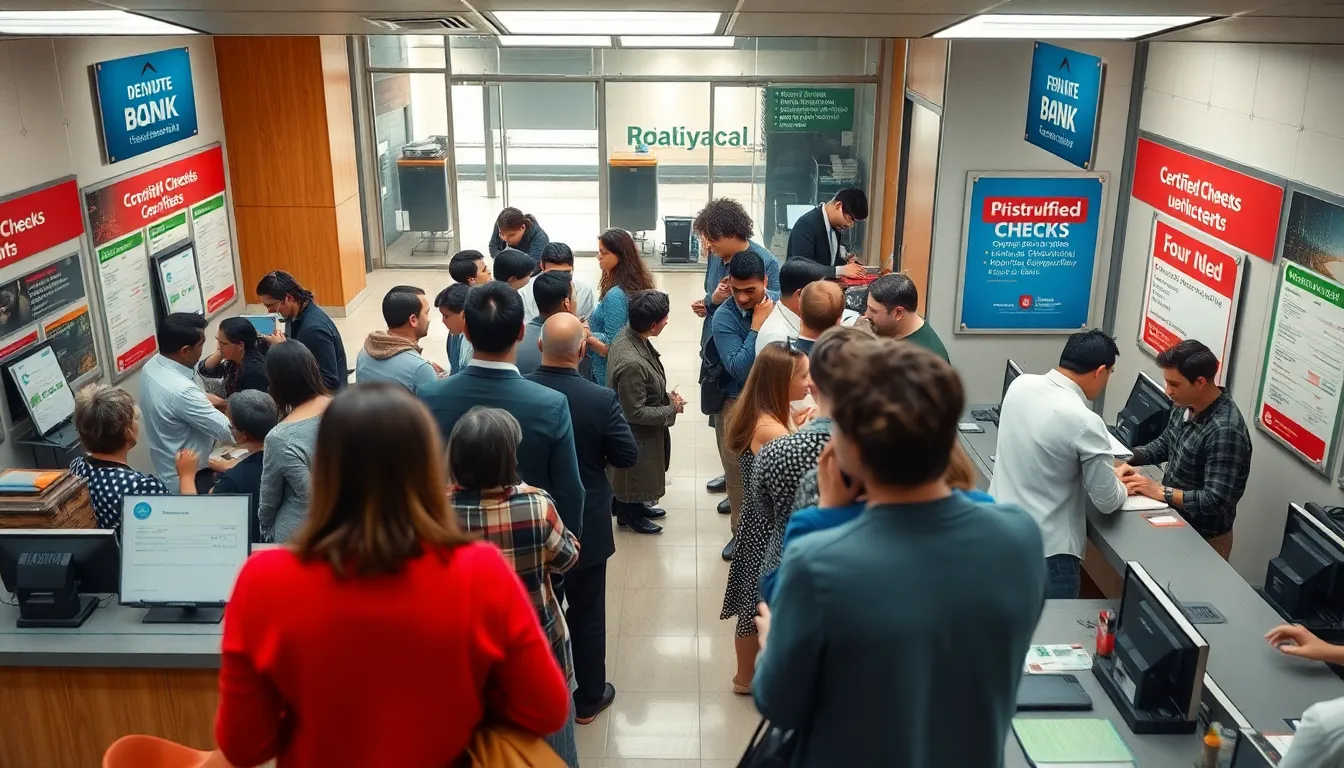Need a certified check but don’t know where to go? Don’t worry, you’re not alone. Whether you’re making a big purchase or settling a bill that’s more than your last three paychecks combined, a certified check can be your best friend. It’s like having a superhero in your wallet—ready to save the day when cash just won’t cut it.
But finding the right place to snag one can feel like searching for a needle in a haystack. Banks, credit unions, and even some grocery stores offer certified checks, but which one’s right for you? Fear not! This guide will help you navigate the world of certified checks, ensuring you get what you need without breaking a sweat—or your bank account. So grab a snack, kick back, and let’s dive into the ins and outs of securing that all-important certified check.
Table of Contents
ToggleUnderstanding Certified Checks
A certified check ensures payment by guaranteeing the availability of funds. Due to this reliability, individuals often choose certified checks for large transactions or important purchases.
What Is a Certified Check?
A certified check is a personal check stamped by a bank. Its designation confirms that the check writer has sufficient funds in their account. Banks typically place a hold on these funds once the check receives certification. This process protects the recipient from bounced checks. Consider a certified check as a reliable form of payment; it offers assurance that the funds will be available when needed.
How Does a Certified Check Work?
Obtaining a certified check involves visiting a bank or credit union. When an individual requests one, bank representatives verify their funds. The bank then marks the check as certified, ensuring the specified amount is reserved. Accepting a certified check is beneficial for both parties in a transaction. Recipients gain confidence knowing the risk of insufficient funds is mitigated. This payment method serves as a secure alternative to cash or personal checks.
Where to Get a Certified Check

Finding a certified check requires knowing where to look. Several options exist to obtain this secure payment method.
Banks and Credit Unions
Most banks and credit unions offer certified checks. Customers visit branches to request checks, with staff verifying available funds. Fees for obtaining a certified check vary, ranging from $5 to $15. Personal accounts may yield lower fees compared to accounts held in business names. It’s often recommended to call ahead and check requirements, as some institutions may need additional identification. Certified checks from banks or credit unions carry a solid reputation and help ensure funds are guaranteed.
Check-Cashing Locations
Check-cashing locations also provide certified checks. These establishments cater to individuals who may not have bank accounts or prefer convenience. Fees at these locations might be higher, typically between $10 and $20. Verification usually remains consistent, but customers should confirm the services provided. Not every location offers certified checks, so calling in advance ensures availability. While these checks can expedite payments, using traditional banks often provides a safer experience when authenticating funds.
The Process of Obtaining a Certified Check
Obtaining a certified check is straightforward, typically requiring a visit to a bank or credit union.
Required Documents
Identification is essential when requesting a certified check. Most banks require a government-issued ID, such as a driver’s license or passport. Account information must also be provided to verify sufficient funds. Some institutions may ask for additional documentation, like proof of address or social security number. It’s wise to call ahead and confirm specific requirements, as these can vary between banks and credit unions. Ensuring you have the necessary documents streamlines the process, making it easier to secure your certified check promptly.
Fees and Processing Times
Fees for certified checks generally range from $5 to $15 at traditional banks. Credit unions may charge similar rates, although some offer lower fees for members. Processing times are typically quick; customers often receive the check during the same visit. However, check-cashing locations can impose higher fees, typically between $10 to $20. These venues might also process checks faster, catering to those in urgent need of funds. Being aware of potential fees and processing times can help individuals choose the best option for their circumstances.
Alternatives to Certified Checks
Several options provide secure payment methods besides certified checks. Each alternative has unique features that cater to different needs.
Money Orders
Money orders offer a reliable option for sending payments securely. They can be purchased at banks, post offices, or retail stores, making them easily accessible. Typically, money orders have a maximum limit, often around $1,000, which may not suit larger transactions. Buyers must pay upfront, ensuring that the funds are available, similar to certified checks. Fees for money orders usually range from $1 to $5, depending on the issuer, making them a cost-effective choice.
Cashier’s Checks
Cashier’s checks provide an alternative method for significant transactions. Banks issue these checks, guaranteeing funds, which gives recipients confidence in their authenticity. Unlike personal checks, cashier’s checks draw from the bank’s account, ensuring sufficient funds for payment. Fees for obtaining a cashier’s check range from $10 to $15, which can vary by institution. Processing times for these checks are generally quick, with customers often receiving them instantly at the bank.
Finding the right source for a certified check can simplify large transactions and provide peace of mind. Whether opting for a bank or credit union, individuals should consider their specific needs and the associated fees. It’s crucial to verify requirements ahead of time to ensure a smooth process.
Alternative payment methods like money orders and cashier’s checks also offer secure options for those who may not need a certified check. By understanding these choices, individuals can make informed decisions that best suit their financial situations.



